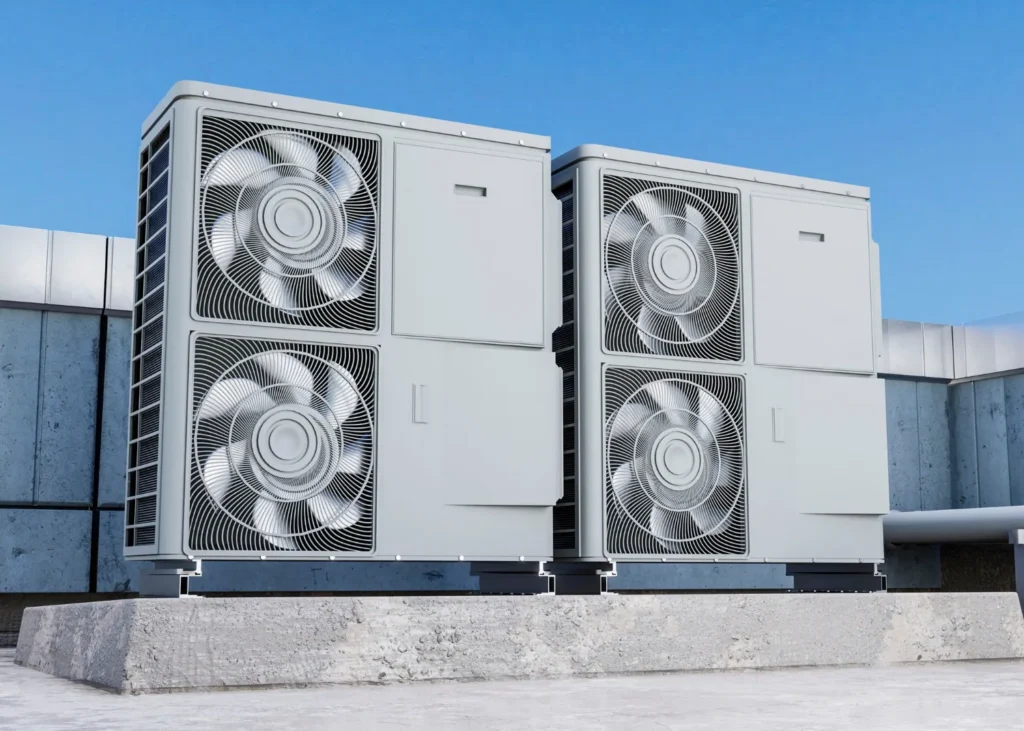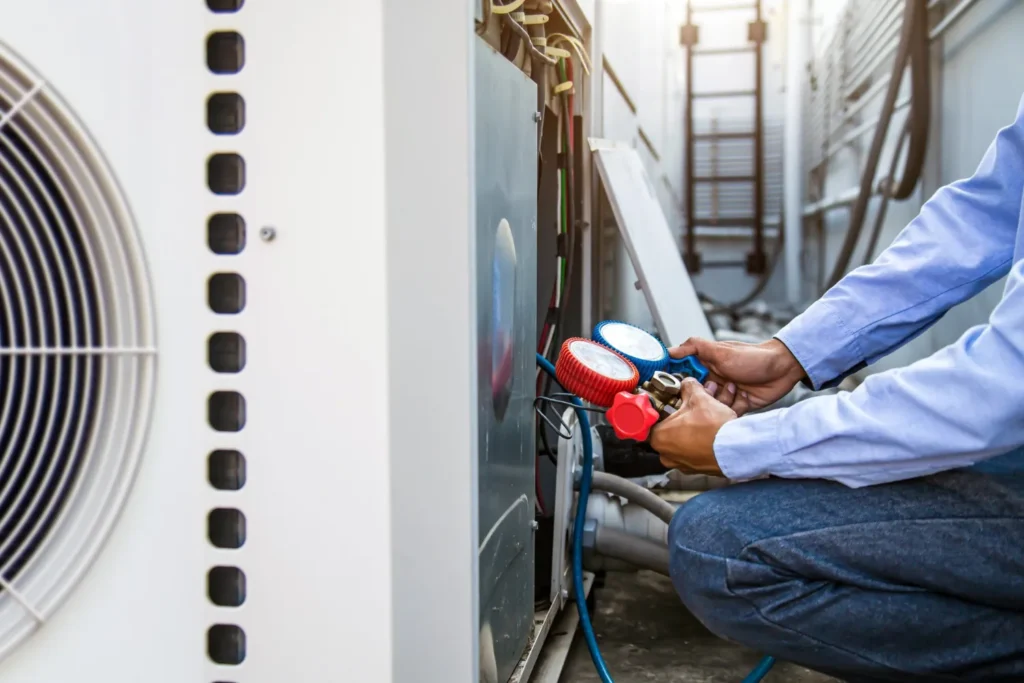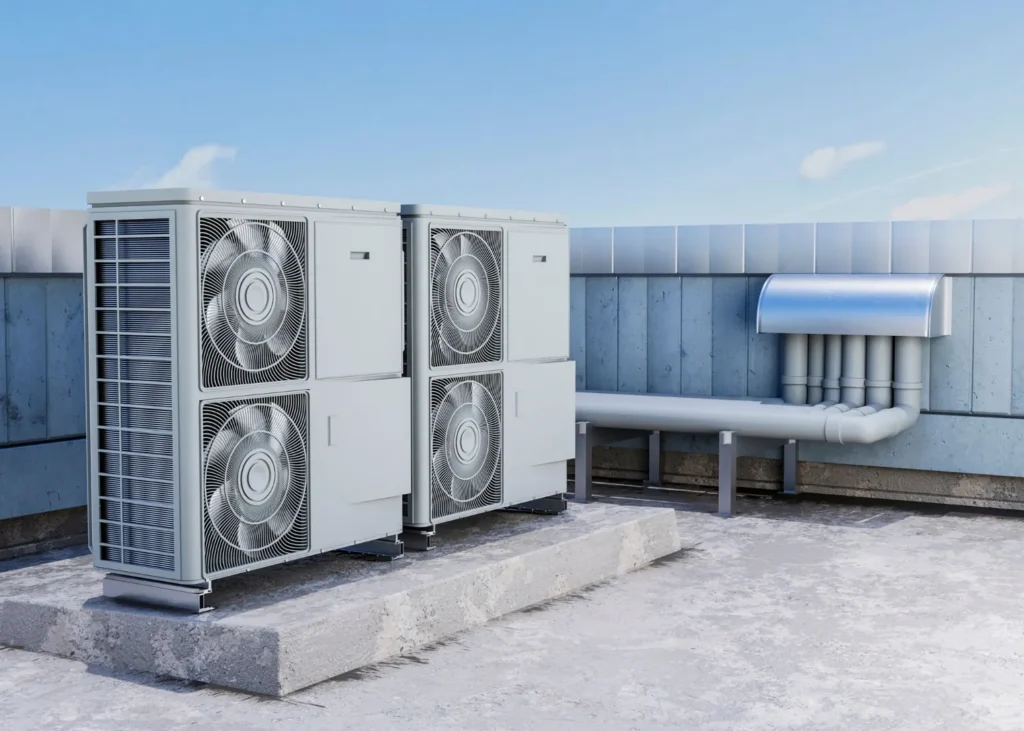Houston, Texas, is known for its severe weather conditions, with blistering heat and intense humidity, making air conditioning systems a luxury and an essential part of daily life. This guide provides an in-depth look at the best types of air conditioners in Houston and the diverse kinds of AC units available in Houston, ensuring that both homeowners and business owners can make knowledgeable choices suitable for their specific needs. These systems are crucial for cooling relief and effective dehumidification in indoor environments, helping to manage the challenging climate of this dynamic city.
As we delve deeper into this guide, we will explore various air conditioning options, detailing their functionalities, advantages, and how well they fit into Houston’s unique weather patterns. This will aid you in selecting the most fitting air conditioning system to maintain comfort and optimize efficiency year-round in Houston.
Table of Contents
Overview of the Unique Climatic Demands in Houston
Houston’s climate is characterized by long, sweltering summers where temperatures often soar to the high 90s and beyond. Coupled with high humidity levels, the environment can be uncomfortable and hazardous without proper air conditioning. Effective air-conditioning systems in Houston must do more than pump cold air; they need to efficiently remove moisture from the indoor air to maintain comfort and protect the structural integrity of buildings. Choosing the correct type of AC unit, such as central air conditioners or ductless mini-splits, can significantly impact maintaining a cool and dry indoor environment.
Importance of Selecting the Appropriate Air Conditioning System
Selecting the right types of air conditioning system in Houston is crucial for comfort, energy efficiency, and cost-effectiveness. With the high energy cost and the environmental impact of running an air conditioner, Houston residents must consider systems like high SEER-rated central air conditioning or energy-efficient ductless mini-splits. The right system will handle the Houston heat and work efficiently to keep energy bills manageable and reduce the need for frequent repairs.
Central Air Conditioning Systems

Central air conditioning is a popular choice in Houston, particularly for larger spaces needing consistent cooling across multiple rooms or zones. These systems comprise a large compressor unit located outside and an indoor air handler that pushes cool air through a network of ducts. This setup is especially effective in maintaining a uniform temperature throughout large homes or commercial spaces, making it a staple in Houston’s residential and commercial AC markets.
Pros and Cons of Central Air Systems
Pros:
- Efficient Whole-Home Cooling: Capable of cooling large areas evenly and effectively.
- Air Quality Control: Often equipped with advanced filtration systems that help improve indoor air quality by removing particulates and allergens.
- Less Noise Inside: Since the compressor, the noisiest component, is located outside, these systems are quieter inside than many other options.
Cons:
- Higher Initial Investment: Installation can be expensive, particularly if ductwork needs to be added or updated.
- Potential for Energy Waste: If not correctly maintained, ductwork can leak, leading to energy loss and higher utility bills.
- Requires Space: The ductwork needs adequate space in walls and ceilings, which can be a constraint in older buildings or renovations.
Compatibility with Houston’s Climate
Central air conditioning systems are highly compatible with Houston’s climate because they efficiently manage both cooling and dehumidifying. These systems are ideal for dealing with Houston’s high temperatures and humidity levels, ensuring that indoor environments remain comfortable and safe throughout the hot months. Integrating smart thermostats and other modern HVAC technologies also enhances energy management. Further, it aligns with the needs of energy-conscious Houston residents.
Ductless Mini-Split Air Conditioners
Ductless mini split air conditioners systems offer a versatile air conditioning solution for Houston homes and businesses that require flexible zoning capabilities without the need for extensive ductwork. These systems include an outdoor compressor connected to one or more indoor air handling units. Each unit can be controlled independently, providing personalized comfort in rooms or zones without cooling unoccupied spaces.
Advantages and Disadvantages of Mini-Splits
Pros:
- Flexible Installation: Mini-splits can be installed in various locations without the constraints of ductwork.
- Energy Efficiency: Mini-splits tend to be more energy-efficient because they allow for zoned heating and cooling, reducing overall energy costs.
- Individual Control: Each unit can be adjusted independently, allowing for customized temperatures in different areas.
Cons:
- Higher Cost per Unit: While offering significant operational savings, the initial cost per cooling zone can be higher than traditional systems.
- Aesthetic Considerations: The indoor units are visible and may not integrate seamlessly into every interior design.
- Requires Professional Installation: To ensure efficiency and longevity, professional installation by experienced HVAC technicians is recommended.
Suitability for Houston’s Residential and Commercial Spaces
Ductless systems are particularly suitable for Houston’s diverse architectural styles and building layouts, from historic homes that cannot accommodate traditional ductwork to modern office spaces that require flexible cooling options. Their high energy efficiency and ability to provide targeted cooling make them an excellent choice for the hot and humid Houston climate. Additionally, their scalability allows for expansion as needs grow or change, providing a future-proof solution for residential and commercial applications.
Window Air Conditioners
Window air conditioners are a compact solution ideal for smaller spaces or situations where a temporary or quick-fix cooling solution is needed. These units are designed to fit within the confines of a window frame, making them easy to install and relatively portable. They work by drawing hot air from the room, cooling it inside the unit, and recirculating the chilled air back into the room.
Benefits and Limitations of Window AC Units
Pros:
- Cost-Effective: Window units are generally less expensive to purchase and install than other air conditioning systems.
- Ease of Installation: Homeowners can often install these units without professional help, reducing installation costs.
- Portability: Window air conditioners can be removed and reinstalled in different windows, offering flexibility.
Cons:
- Limited Cooling Area: They are generally only effective for cooling the room in which they are installed and are not suitable for larger homes or businesses.
- Obstruction of Views: Window units can block natural light and views from the window where they are installed.
- Security Concerns: Installation can sometimes compromise window security, making spaces vulnerable to break-ins.
How Window ACs Perform in Houston’s Heat
In Houston’s intense heat, window air conditioners can provide a quick and easy cooling solution for smaller spaces or single rooms. However, their efficiency can be challenged on the hottest days, especially if the unit needs to be correctly sized for the room. Regular maintenance, such as cleaning filters and ensuring the unit is free from dust and debris, can help maximize performance. Window AC units offer a viable alternative for those living in apartments or renting properties where modifications like central air or ductless systems are not feasible.
Portable Air Conditioners

Portable air conditioners are free-standing units that can be moved from one room to another to provide targeted cooling. They work by pulling warm air from the room, cooling it through a refrigeration cycle, and exhausting the hot air through a window or venting kit. This type of AC is beneficial in situations where window configurations or building regulations prevent the installation of window units.
Pros and Cons of Portable AC Units
Pros:
- Versatility: Portable air conditioners can be easily moved to where they are most needed, providing demand cooling.
- No Installation Required: Unlike other air conditioning systems, portable units do not require installation, making them ideal for renters or temporary setups.
- Supplemental Cooling: They can supplement central air conditioning in areas that need additional cooling without cooling the entire building.
Cons:
- Less Efficient: Portable air conditioners are generally less efficient than other air conditioning systems. They consume more energy for the amount of cooling they provide.
- Noise Levels: These units can be noisy and disruptive in quiet environments.
- Space Usage: Portable units take up floor space, which can be a drawback in smaller rooms or crowded office spaces.
Assessing Portable ACs for Houston Environments
While portable air conditioners offer convenience and immediate relief from heat, their efficiency in Houston’s extreme climate can be a concern. They are best used for spot cooling or in conjunction with other cooling systems rather than as a primary source of air conditioning. Portable air conditioners are an adequate solution for small apartments, temporary workspaces, or specific areas that require occasional cooling. However, other types of air conditioning systems may be more appropriate for those needing more robust and efficient cooling solutions.
Heat Pumps
Heat pumps are versatile options for cooling and heating, making them excellent choices for year-round climate control. In the cooling mode, heat pumps extract heat from inside the home and release it outside, similar to a standard air conditioner. In heating mode, the process is reversed, and heat is extracted from the outdoor air and pumped indoors. This dual functionality makes heat pumps an energy-efficient solution for areas with milder winters, like Houston.
Evaluating the Pros and Cons of Heat Pumps
Pros:
- Energy Efficiency: Heat pumps are among the most energy-efficient heating and cooling systems. They use less energy than traditional HVAC systems by transferring heat rather than generating it.
- Cost-Effective: Over time, the energy savings provided by heat pumps can offset the initial higher installation cost.
- Reduced Carbon Footprint: Heat pumps have a lower carbon footprint than systems that rely on fossil fuels because they use electricity and heat transfer for cooling and heating.
Cons:
- Higher Initial Costs: While operational costs are lower, the initial installation of a heat pump can be more expensive than other heating and cooling systems.
- Performance in Extreme Cold: Although not a significant issue in Houston, heat pumps can lose efficiency in frigid climates since they rely on extracting heat from the outdoor air.
- Requires Proper Sizing and Installation: Heat pumps must be correctly sized and professionally installed to function efficiently, which can increase initial costs.
Effectiveness of Heat Pumps in Houston’s Varied Climate
In Houston, where the winters are mild, heat pumps offer an efficient and economical solution for year-round climate control. They are particularly effective in environments where heating and cooling are needed but where extreme cold is not a concern. Switching between heating and cooling modes also provides flexibility for changing weather patterns typical of the Houston area. Given the energy efficiency and environmental benefits, heat pumps are an increasingly popular choice among Houston homeowners and business owners looking to reduce their energy usage and enhance indoor comfort.
Geothermal Cooling Systems
Geothermal cooling systems use the earth’s stable temperatures to cool and heat buildings. By circulating a water-based solution through pipes buried in the ground, these systems take advantage of the consistent underground temperature to cool homes and offices efficiently. In cooling mode, the system extracts heat from the building. It transfers it to the ground, providing practical and environmentally friendly cooling.
Advantages and Challenges of Geothermal Systems
Pros:
- Extreme Efficiency: Geothermal systems are among the most energy-efficient on the market. They use very little electricity to transfer heat to and from the ground.
- Longevity and Reliability: These systems have fewer moving parts and are not exposed to outdoor elements, which can extend their lifespan and reduce maintenance costs.
- Eco-Friendly: Geothermal systems reduce the reliance on fossil fuels and decrease greenhouse gas emissions, making them a sustainable choice for eco-conscious consumers.
Cons:
- High Initial Investment: The upfront cost of installing a geothermal system, including excavating and installing underground pipes, can be significant.
- Land Requirements: A sufficient amount of land is needed to install the underground loop system, which can be a barrier in urban areas.
- Complex Installation: Installing a geothermal system is more complicated and invasive than other air conditioning systems. It requires significant planning and expertise, which can add to the overall cost.
Feasibility of Geothermal Cooling in Houston
In Houston, the feasibility of geothermal cooling systems is exceptionally high due to the relatively stable underground temperatures and the area’s flat topography, which facilitates the installation of the necessary underground infrastructure. Although the initial investment is high, the long-term energy bill savings, low maintenance costs, and environmental benefits make geothermal systems an attractive option for residential and commercial properties. They are especially suited to new construction projects where the installation can be integrated into the building plans from the outset.
How to Choose the Right Type of Air Conditioners in Houston

Selecting the correct type of air conditioner in Houston involves more than just considering the size and cost. It requires a deep understanding of the various systems available and their capabilities to handle the extreme heat and humidity characteristic of the Houston climate. This section will guide you through the critical factors to consider, ensuring you choose an air conditioning system that meets your needs for comfort and efficiency.
Size of the Property
- Square Footage: The size of the area that needs cooling is crucial. A small unit won’t cool effectively, while one too large can lead to inefficiency and increased humidity.
- Room Layout and Insulation: The number of windows, insulation quality, and room layout (open vs. segmented) also affect cooling needs.
Energy Efficiency
- SEER Rating (Seasonal Energy Efficiency Ratio): Look for a high SEER rating indicating better energy efficiency. In Houston, where ACs run more frequently, a higher SEER rating can lead to significant savings.
- Energy Star Certification: Opt for units that meet or exceed EPA guidelines for energy efficiency.
Type of Installation
- Existing Ductwork: A central air conditioning system might be more cost-effective if your home already has ductwork.
- Retrofitting Needs: Consider whether the cost of installing ducts is justified for homes without ductwork or if a ductless system might be more appropriate.
Cost
- Initial Investment: Determine your budget for purchase and installation costs. Central systems are generally more expensive upfront compared to window or portable units.
- Operating Costs: Consider the long-term operating costs. More efficient systems often offer lower monthly bills.
Maintenance and Durability
- Maintenance Requirements: Some systems require more frequent maintenance than others. For instance, central air systems and heat pumps need regular checks on their ductwork and mechanical parts.
- Lifespan: Central AC systems and geothermal units generally have longer lifespans than portable or window units.
Climate Suitability
- Dehumidification Needs: Given Houston’s high humidity, choose a system that excels in moisture control. Systems like central air conditioners and ductless mini-splits are typically better at controlling humidity.
- Heat Capability: If you need heating and cooling, consider a heat pump, which can do both efficiently in Houston’s mild winter climate.
Zoning Capabilities
- Individual Room Control: If you prefer different temperatures in different rooms, ductless mini-splits offer zoning solutions that allow for separate control without cooling or heating unoccupied spaces.
Aesthetics and Space
- Visible Components: Consider how the unit’s appearance will affect your home’s aesthetics. Window and portable units can be more intrusive, whereas central and ductless systems are less visible.
- Space Constraints: Assess the available space for installation. Ground-mounted and rooftop placements have different implications for space and Noise.
By carefully considering these factors, you can select an air conditioning system that meets your cooling needs and operates efficiently and cost-effectively in Houston’s challenging climate.
Conclusion – Types Of Air Conditioners
Houston’s diverse and demanding climate requires careful consideration when selecting an types of air conditioners. From robust central air units to flexible ductless mini-splits, economical window units, and innovative geothermal systems, various options suit different needs and preferences. Each system has its strengths and can provide relief from the heat while maintaining efficiency and control over energy costs.
We encourage all Houston residents and business owners to consider their options carefully and make informed decisions regarding their air conditioning needs. By understanding the specific demands of the Houston climate and evaluating the available systems, you can ensure optimal comfort for your home or business while managing energy use and costs efficiently. Remember, the right air conditioning system not only cools but also enhances the quality of life by improving the indoor air quality and comfort of your living or workspace.
FAQs About Types Of Air Conditioners
How can I determine the best type of AC unit for a Houston-area business?
The best type of AC unit for a business in Houston depends on several factors, including the size of the business premises, the layout, and specific cooling needs. Central air conditioners are generally suitable for larger commercial spaces. At the same time, ductless systems can be ideal for smaller offices or buildings with multiple rooms.
Are geothermal cooling systems a good investment for Houston properties?
Geothermal cooling systems are highly efficient and can be an excellent investment for Houston properties, especially new constructions. Due to their high efficiency, they offer long-term savings on energy costs, though the initial installation cost is higher than traditional systems.
What are the maintenance needs for different types of AC units in Houston?
Maintenance needs can vary by system type. Central and ductless systems typically require bi-annual maintenance to ensure efficiency, including checking and cleaning filters, inspecting ducts, and servicing mechanical parts. Window and portable units also need regular cleaning and occasional servicing.
How does the SEER rating affect my choice of air conditioner in Houston?
The SEER (Seasonal Energy Efficiency Ratio) rating indicates the energy efficiency of an air conditioning unit. A higher SEER rating (typically 16 or above) can lead to significant energy savings in Houston, where AC systems are used heavily. Choosing a unit with a high SEER rating is advisable to manage cooling costs effectively.
Can window or portable air conditioners be effective in Houston’s climate?
Window and portable air conditioners can effectively cool smaller spaces or provide supplemental cooling in Houston’s climate. However, they might need to be more sufficient for whole-home or large-space cooling due to their lower efficiency and limited cooling capacity than central or ductless systems.
How long do air conditioning systems typically last in Houston’s climate?
In Houston, air conditioning systems typically last 10 to 15 years. However, the lifespan can vary based on the type of system, the quality of installation, how well it is maintained, and the intensity of use during the hot months.
What should I look for in an HVAC contractor in Houston?
When selecting an HVAC contractor in Houston, look for someone licensed and insured, with good reviews or testimonials, who offers clear and detailed quotes and has extensive experience with the type of system you want to install. Additionally, ensure they offer good after-installation support and service.
How do I know if my current air conditioning system is energy-efficient enough for Houston’s weather?
Evaluate the energy efficiency of your current system by checking its SEER rating. Systems with a SEER rating of 16 or higher are considered efficient for Houston’s climate. Additionally, your energy bills are unusually high or have been increasing. In that case, consider an upgrade to a more efficient system.
Are there specific features to look for in an air conditioner to combat Houston heat and humidity?
When choosing an air conditioner for Houston, look for systems with built-in dehumidifiers or those that specify humidity control features. Variable-speed fans and compressors are also beneficial as they adjust cooling output to match the need, which can help maintain more consistent humidity levels indoors.
Is it worth investing in smart or programmable thermostats for air conditioners in Houston?
Absolutely! Smart or programmable thermostats can significantly enhance the efficiency of air conditioning systems in Houston by allowing for better temperature management, scheduling, and energy usage monitoring. They can adjust the temperature based on your schedule and preferences, potentially leading to lower energy bills and improved comfort.




